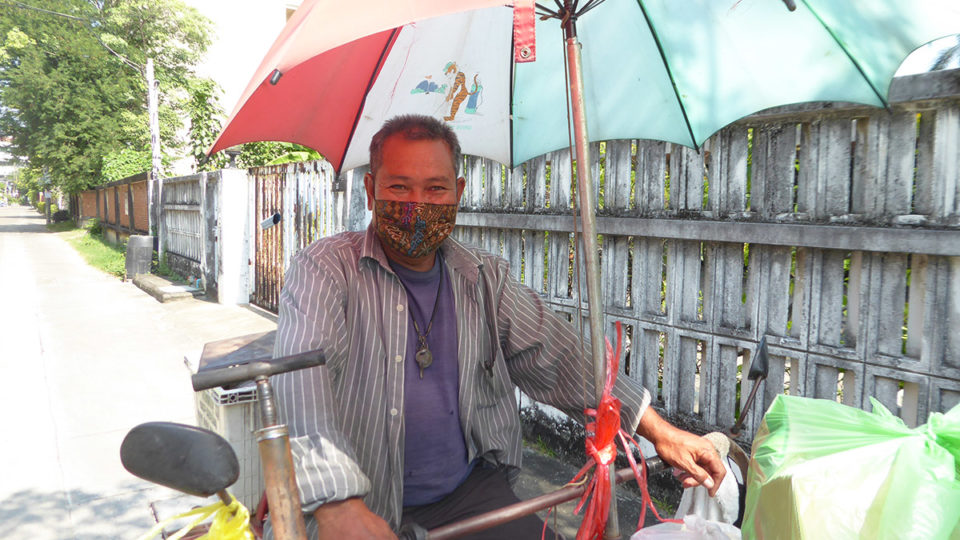Every weekday at 7am Leung Ban climbs onto his motorized, three-wheeled cart and sets off in search of Bangkok’s unwanted trash.
Sheltering from the sun under an aging umbrella tied to his tricycle or salaeng, he plies the streets around the capital’s Phra Khanong, Ekkamai and Rama IV areas looking to buy cardboard, newspapers, cans, plastic bottles and e-waste.
Leung Ban (Uncle Ban) is one of many overlooked heroes of Bangkok’s patchy recycling system, who make a living selling garbage to the middlemen who supply Thailand’s larger recycling companies. Market prices per kilogram vary, with clear plastic PET bottles selling for THB8.5, and aluminum cans fetching THB30. But these amounts are not necessarily what a waste collector receives.
“Although I collect waste for eight hours a day, it’s not enough to get by. Food and rent are expensive,” 55-year-old Uncle Ban told Coconuts. “I finish collecting at 3pm and begin my second job as a driver. I drive on weekends too and fit organizing the recycling ready for sale in between,” he continued.
It’s unclear how many people work informally alongside Uncle Ban in the capital, but one estimate put it at 25,000 in 2003. In today’s tough economic conditions, experts believe considerably more people now do this work.
Hailing from the northeastern province of Roi Et, Uncle Ban is married with two adult children and has been a waste picker for a decade now. This income is essential as the family’s rice farm, which he returns to tend once a year, does not earn much.
“Waste collecting has helped me pay for my kids’ education,” Uncle Ban said proudly. Smiling, he relayed how his 23-year-old daughter is set to graduate from university with a science degree.
This is a significant financial commitment for workers like Uncle Ban, who face unpredictable daily incomes as prices of recyclable goods can fall fast and without warning due to events beyond their control.
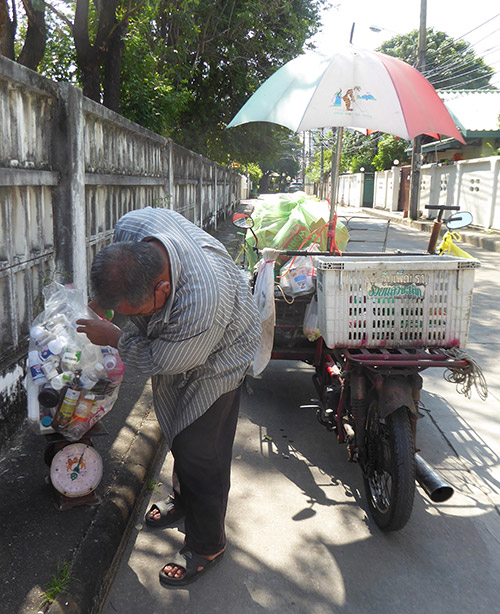
Unstable income
Money made from waste collecting has dropped off since the coronavirus hit. “It varied, but I was getting 200 to 300 baht per day. Now it’s more like 100 baht,” Uncle Ban said.
The decline in earnings is backed by recent research from the UN’s Social and Economic Commission and the Stockholm Environment Institute. Diane Archer, a senior research fellow with the later, is studying the sector in Bangkok and said most of the 34 waste collectors she interviewed saw their incomes drop.
The reason why is unclear. Bangkok’s plastic waste soared 62% in volume during last year’s lockdown. Despite this, many of Archer’s respondents felt the amount of plastic available to them decreased during the pandemic. Some thought this was because more people turned to waste collecting to generate income as the economy stumbled, leaving fewer materials to go around.
Uncle Ban saw prices drop even before COVID-19 when, in 2018, China banned the import of recyclable solid waste, including plastics resulting in a surge in the arrival in Thailand of both plastic and e-waste. “Lots of material came in large amounts by boat. This sold more cheaply than the items I was collecting and so the price I received fell,” he explained.
Plastic waste exploding as Thais stay at home: Environment Institute
In hard times, Uncle Ban has borrowed money from the dealers he sells to: “I repay them with the recyclables I collect. It works for me as the loan is interest-free!” he said.

Risky business
Waste collectors face challenges similar to other informal workers, Archer said.
There are no formal protections or labor rights to ensure fair treatment, meaning benefits others enjoy, like sick pay or holidays, are nonexistent. Health and safety is also problematic.
Digging through public bins or scouring landfill sites is often part of the job, leaving waste collectors vulnerable to injury and illness from handling dirty or hazardous materials. They come across toxic chemicals from industry, used facemasks and even so-called ‘pee bottles’ filled with urine.
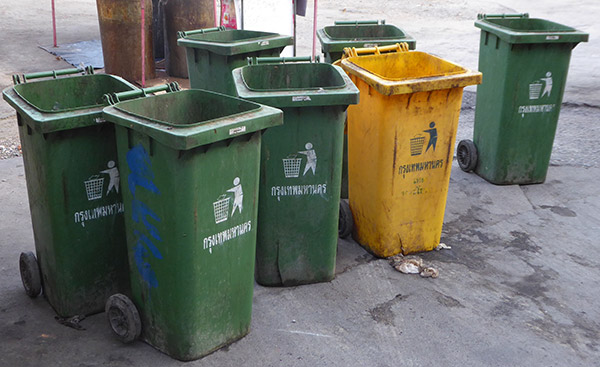
Skin diseases and irritations are common. Personal protective equipment is not widely used.
“Collectors must provide their own and only half of those interviewed used masks, hats or gloves,” Archer reported in her ongoing study.
Despite these difficulties, waste collectors are performing vital environmental work.
“The more waste gets recycled, the lower our impact on the environment,” Archer said.
For example, less waste ends up in pollution-producing incinerators and recycling plastic and other materials reduces what’s sent to landfill sites known to leak harmful substances and emit greenhouse gases.
Economically, she says there are big benefits too: The waste gathered by informal waste workers is waste that the Bangkok Metropolitan Administration doesn’t have to collect, reducing government operating costs.
Informal collectors are credited with saving the government THB500 million (USD$16.8 million) per year across Bangkok’s 50 districts. This saving is greater than the average yearly amount the BMA spent on the entire waste collection system between 2011 and 2013.
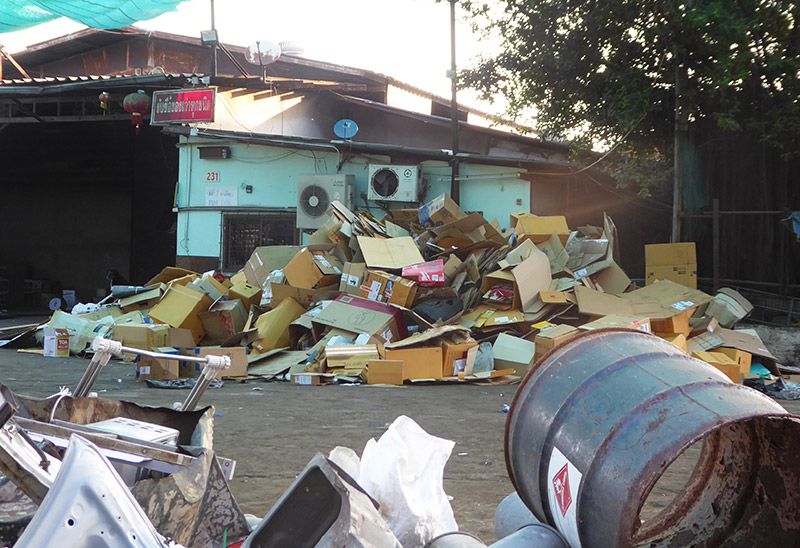
Makeshift system
Bangkokians don’t just have to rely on salaeng-riding free agents like Uncle Ban to recycle. Big companies and grassroots groups run recycling projects with drop-off points around the city collecting everything from plastic caps to UHT milk cartons.
Additionally, municipal refuse collection crews can be seen frantically separating recyclables on the go; often while standing right in the back of their moving garbage trucks. Bagged up and stowed on the roof, it’s all sold at the end of the shift, with the crew splitting the profits.
Street-based waste collectors; official refuse collectors earning on the side; well-meaning projects and the seriously poor scavengers picking over our landfill sites together represent a makeshift system that may struggle to meet Thailand’s laudable commitment of 100% recycling by 2030.
Recycling is not only haphazardly organized, but it was reported in 2014 that only “8% of the total population actually separate their waste,” Archer highlighted. Others see this problem too:
“We lack proper incentives and infrastructure to encourage people to get involved,” explained Pavini Sethi.
Sethi is project manager at BeesGreen, a start-up venture looking to break into the system. She also helped translate some of the material for this story.
“There are rarely separate street bins to help sort waste and some people distrust the current recycling system believing that any trash they divide up is combined into one pile when municipal collectors pick it up,” she said.
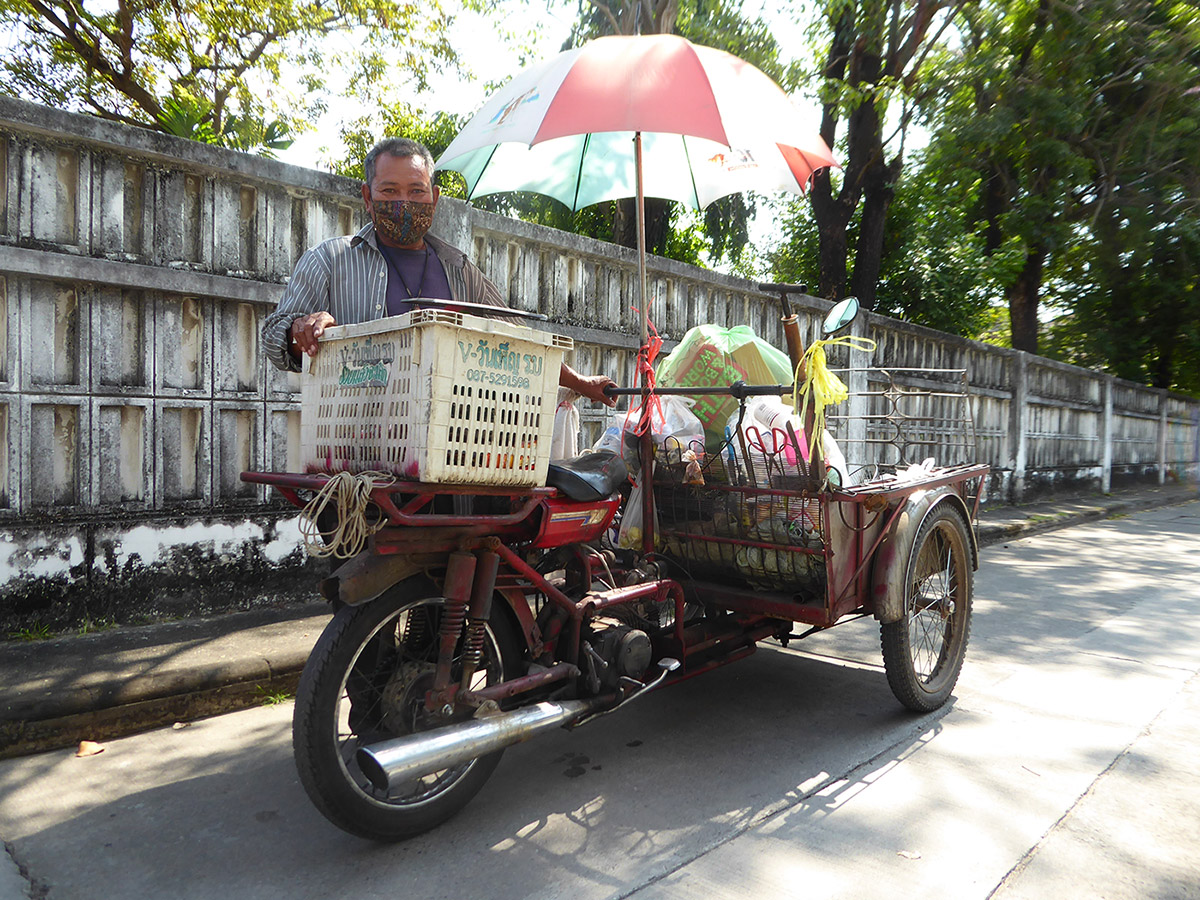
Updating the system
Sethi believes there’s room for innovation. Looking for funding to get going, BeesGreen hopes to combine eco-friendly shopping and recycling services together in a single app.
Customers would be able to purchase sustainable products and have their recyclables collected when the goods are delivered. Recycling pickups would also be bookable without the need to shop.
“We’d like to offer internships for local youth to learn about materials science, customer relations and business strategy; and train them to run recycling operations in their local areas,” Sethi enthused.
“According to the Pollution Control Department only 20% of our municipal solid waste is recycled, leaving BeesGreen room to complement existing informal street-based methods. We hope to formally employ salaeng operators to supervise our interns too,” she said.
Other organizations are already up and running. Recycle Day serves around 100 private communities (mainly gated neighborhoods). Each community agrees to sort and put aside their waste. Individual users receive reward points and attach a QR code to their refuse bags which are collected in bulk once or twice a month. Bookings are organized through an app.
Asked what people can do to support recycling efforts Uncle Ban’s message is clear: “Sort your waste into different materials. This saves us time later on.” Archer offered an even quicker fix: “separating waste into ‘wet’ and ‘dry’ bags makes it much easier for the recyclers who have to root through our bins.”
As technology updates his line of work, Uncle Ban looks toward retirement.
“I like being busy and active. I’m happy waste collecting, so I will continue for as long as I’m physically able. Then I will go home to farm. I’m a farmer at heart,” he smiled contentedly. “I will go home and plant rice.”
Meanwhile, it’s hoped Bangkok’s next generation of waste collectors will not remain unsung trash heroes like those before them. As many call for a green recovery to lead us out of the pandemic, the city would do well to wholeheartedly support those tackling the environmental costs of our throwaway society.
Check out Less Plastic Thailand for a step-by-step guide to recycling in Bangkok.
